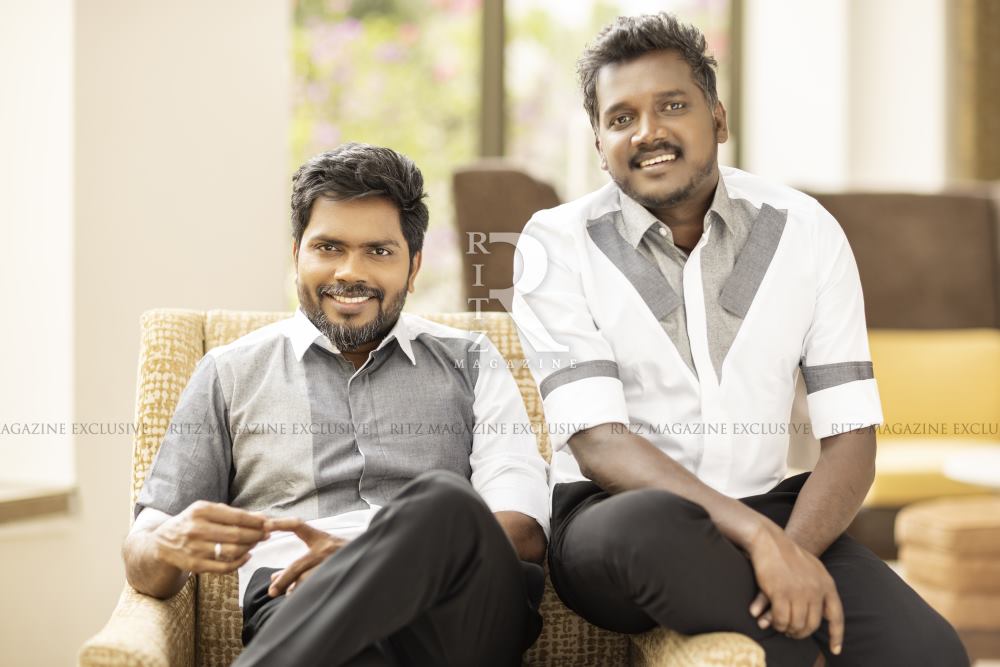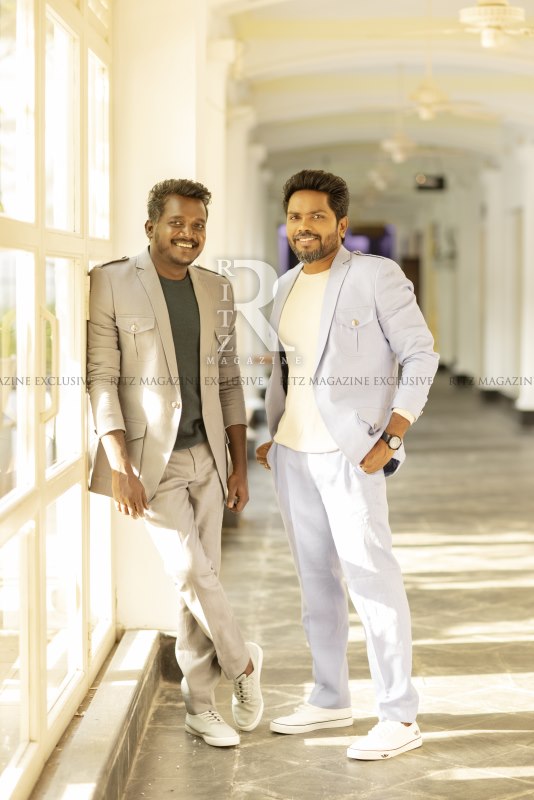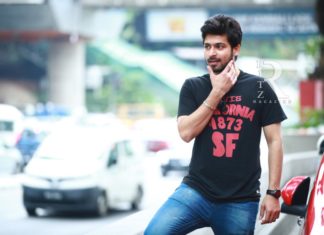They are hot on the heels of their latest productions ‘Sarpatta Parambarai’ and ‘Karnan’ which fearlessly explore various facets of social inequality. Ritz catches up with ace directors Pa. Ranjith and Mari Selvaraj at Crowne Plaza, Chennai as they open up about their filmmaking process, philosophy in life, and more.
 “MY BEING BRASH ABOUT THE SUBJECTS I’M PASSIONATE ABOUT MAY NOT BE EVERYONE’S CUP OF TEA” – PA. RANJITH
“MY BEING BRASH ABOUT THE SUBJECTS I’M PASSIONATE ABOUT MAY NOT BE EVERYONE’S CUP OF TEA” – PA. RANJITH
Text: SIDDHARTH KUMAR
Photography: V.S. ANANDHAKRISHNA
Stylist: SATHYA NJ
Wardrobe: SATHYA NJ FASHION HOUSE
Accessories: BY ELEGANCE
Makeup: VIJISHARATH
Hair: MR.B UNISEX SALON
Location: CROWNE PLAZA, CHENNAI
Many directors have their own views when it comes to political matters and tend to showcase those sentiments in their work. However, when it comes to the political truths portrayed by (both) of you, there’s a constant sense of controversy that inevitably surrounds your work. Why do you feel that is so?
Pa. Ranjith: I believe that is because there’s a lot of truth to what’s being showcased (smiles nonchalantly). I firmly believe that the “controversies” you’re referring to are most definitely healthy topics of discussion that need to be brought to the limelight. I tend to scrutinize subjects and situations with a keen eye for detail. Questions like why a particular subject brings about certain responses in a demography of viewers or whether I’ve broached this topic or storyline in the past and the impact it has had on viewers are aspects I find extremely important to my filmmaking process.
Could you tell us a little more about your process when dealing with sensitive subjects?
Pa. Ranjith: Does the subject rouse a sense of compassion or pity? Have the oppressed and the issues they face regularly been brought to the forefront? I believe that alternate stories such as the ones I’ve explored raise important questions about our current social and political existence. My being brash about the subjects I’m passionate about may not be everyone’s cup of tea and might take some getting used to. However, I do believe that with time, the viewers will step out of their comfort zone to explore the ideas I’ve put forth in a positive manner; while taking a closer look at the social inequalities and injustices that are quite evident today.
 “CONVEYING AND PORTRAYING THE LIVES THAT I’VE COME ACROSS OVER THE YEARS REMAINS AT THE FOREFRONT WHEN IT COMES TO MY FILM MAKING” – MARI SELVARAJ
“CONVEYING AND PORTRAYING THE LIVES THAT I’VE COME ACROSS OVER THE YEARS REMAINS AT THE FOREFRONT WHEN IT COMES TO MY FILM MAKING” – MARI SELVARAJ
How well, in your opinion, have audiences warmed up to your style of filmmaking?
Pa. Ranjith: I do feel that a majority of the audience have taken this positive approach when it comes to analyzing my work – the wide acceptance and response to Pariyerum Perumal is proof of that fact. I quite possibly may not have reached film number 5 on my roster if it weren’t for the success that Pariyerum Perumal brought in. What’s more, the success that movie brought in paved the way for setting up Neelam Productions – and with more movie projects and scripts in the pipeline, I feel it’s become more important than ever to bring these “controversial” topics to light while helping promote a healthy discussion on the subject.
Pa. Ranjith has always been vocal both within his films as well as on public forums about his views – you (Mari Selvaraj), on the other hand, tend to let your films and work carry forward your message. Could you tell us a little more about this approach of yours?
Mari Selvaraj: I don’t believe there’s any hard and fast rule that an artist or scholar is required to showcase their views on a public forum at all times. For instance, I don’t think someone like Pa. Ranjith would have planned ahead to speak upon certain issues while at an event. It just so happens that the situation allows for that conversation to be heard by a wider audience.
How much has your personal journey affected your storytelling?
Mari Selvaraj: When it comes to me, politics and addressing social issues have always been at core of my existence. Having been surrounded by such issues while growing up helped me to bring my experiences to the table, and I’ve tried to let those sentiments and philosophies shine through my work. Conveying and portraying the lives that I’ve come across over the years remains at the forefront when it comes to my filmmaking method. What’s more, I was a student of law before arriving in Chennai. That student phase certainly helped mould my views in a very specific way and my reaching Chennai and the observations I gathered here helped me to learn more about what I feel needs to be addressed. This has perhaps been the most challenging yet fulfilling aspect of my personal journey so far.
From being your usual vocal self when it comes to addressing issues at public events, it appears as though the fiery speeches you (Pa. Ranjith) normally give have reduced in number. What are your thoughts on this?
Pa. Ranjith: There’s no doubt in my mind that one of the primary reasons for my style of filmmaking is attributed to wanting to address socio-political issues. I recall that in my earlier days as a director, anger and aggression was one of my primary fuelling factors – and I never shied away from being “vocal” about those feelings. That said, I do believe that I may have calmed down a lot more now (laughs playfully). I like to live my life by a certain set of ideals, and more often than not, for those to be followed accurately, one may need to alter his or herself in a more positive manner that aligns well with one’s mindset.
“AT THE END OF THE DAY, EACH VOTE THAT’S CAST OUGHT TO COUNT TOWARDS THE BETTERMENT OF SOCIETY” – MARI SELVARAJ
Would you (Mari Selvaraj) agree with Pa. Ranjith’s views on this matter?
Mari Selvaraj: Most definitely! Let’s leave it at that (chuckles softly).
Do you (Pa. Ranjith) feel that a significant change has been brought about amongst audiences and society in general when it comes to being more acutely aware of the socio-political inadequacies that are prevalent at the moment?
Pa. Ranjith: I’ve felt that a huge change has occurred in the past decade alone. Being the voice for the voiceless has always been an “agenda” of mine, and the continued acceptance of my work is proof of this fact. Vote banks in constituencies may exist. However, the bottom line remains that these are the issues that need to be talked about and discussed the most.
Could either of you tell us a little more about the bond and friendship that you share?
Pa. Ranjith: Friendship and our history aside, I’d say that cinema as an entity is what binds us. In fact, I believe our bond has only been strengthened by our collective views on filmmaking and telling the stories that we feel need to be told.
You’ve mentioned in the past that Sarpatta Parambarai was a story that you had conceived close to eight years ago – is there a particular reason as to why it took this long for the movie to see the light of day?
Pa. Ranjith: A story that’s not been told yet – that’s what interested me most about Sarpatta Parambarai. I felt there were a few misnomers and negative stereotypes that surrounded the traditional boxing community that needed addressing and I’ve tried to set the record straight with my take on their lives and livelihood while paying tribute to the rich sporting history and culture of Chennai. I’d initially planned to take a break from the Tamil industry post the release of Kaala. A Bollywood project was on the cards at the time, but that didn’t pan out then due to delays in production and other issues. That’s when I decided that Sarpatta Parambarai will be my next project.
 “I’D SAY THAT CINEMA AS AN ENTITY IS WHAT BINDS US” – PA. RANJITH
“I’D SAY THAT CINEMA AS AN ENTITY IS WHAT BINDS US” – PA. RANJITH
Can you talk us through your work ethic?
Pa Ranjith: I distinctly recall my days as an Assistant Director, shuttling back and forth between directors’ homes and offices, waiting patiently for work opportunities. Now that I find myself on the other side of the wall, I’m very particular that the person or people who approach me for work should be treated with utmost respect and that they remain comfortable throughout the entire time they are in my office or in my presence. I think it’s extremely important as an artist and more so as a human being to be empathetic and to put yourself in the other person’s shoes.










 Raashii Khanna
Raashii Khanna










